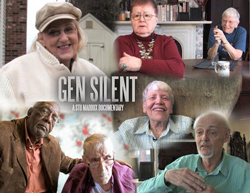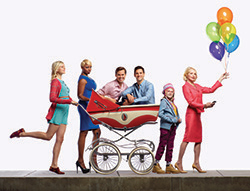For generations, the subject of homosexuality has been one of the most dismissed and controversial subjects that people talk about. Some have looked down on homosexual men and women, while others pay no mind and accept them for who they are. Many are neutral on the subject, saying that it’s a matter for those individuals to decide.
Stu Maddux, director of Gen Silent, has directed two other documentaries on adults living alternative lifestyles. He is an outspoken lesbian, gay bisexual and transexual (LGBT) rights activist and has led discussions in conferences across the nation, including those run by the American Psychological Association.
Gen Silent follows seven individuals, all of them in same sex relationships, and all of them in their fifties and above. Not only are they discriminated by people in general, they have problems that inevitably occur with the coming of old age. These situations clash when anti-LGBT mentalities prevent them from receiving the proper end-of-life care that they deserve.
Gen Silent came to the University as part of On Screen, In Person film series, wherein independent film makers tour with their films to discuss pressing issues across the world. Andrew Demirjian, a specialist professor from the Communications Department, enjoys the series. “[It] is a great opportunity for our students to learn firsthand from Emmy award winning and Oscar nominated directors. Their views complement and expand on what we are covering in class and it brings a variety and diversity of production approaches for students to be exposed to,” says Demirjian.
Usually when the topic of homosexuality comes up, the people who discuss it are referring to their peers, but it’s not just about their generation they should take into consideration. Just like teenagers can’t believe their parents were once their age, the younger generation doesn’t realize that homosexuality has been around for years and that our elders have been fighting this kind of discrimination since they were young.
But what happens when those same elders, members of a generation that were once our age, are still fighting for acceptance?
The seniors featured in this movie have faced extreme discrimination in numerous circumstances.
Lawrence’s partner, Alexander, is confined to a nursing home, slowly fading to the afterlife. Krysallis is a 59-year-old Vietnam War Veteran who had a sex change and has been abandoned by her family, including her son. Mel and Walter are two men who have never admitted that they are a couple. Lois and Sheri are borderline recluses who barely venture outside together, not even getting involved with the gay community. They are comfortable with, and love, each other, but throughout the film there is a sense of loneliness about the two.
This documentary is a revealing look at the lives and pasts of these seven individuals that tragically shows the fact that not much has changed for them, even after all these years.
As Lawrence states, he feels like a caterpillar in a cocoon that can’t transform into a butterfly; he is still hiding, as are all of them, in a way. Alexander has always been hiding and Lawrence wasn’t even his first partner. His first partner committed suicide, while Lawrence reveals he has contemplated it, fearing he would have nothing to live for after Alexander.
Krysallis even sounds like she’s disappointed that it takes so long to die. There are moments of hope throughout the film but they are arguably few and far between. Some of them are involved with the gay community, where the director shows them happy to be with people just like them but you get the feeling they want more.
The movie takes place over the course of a whole year, allowing the audience to be part of the journey these individuals are taking to slowly get their story out, share their hardships and find the strength to continue on.
Not every member survives to the end of the film. Other individuals sound as if they are continually trying to get by in a world that won’t be kind to them.
Maddox captures these revealing insights through one on one interviews, with these seven individuals and also social workers and nursing home staff members whose job it is to take care of these elders- but they are compromised by their beliefs.
According to The Fenway Institute, over 50% of nursing home workers said that coworkers are intolerant of homosexuality and that 4 of 5 non-heterosexual elderly persons do not trust the health care system.
Maddox captures not only Krysallis’s fight for acceptance but also the fight for h er l ife. W hat m akes h er struggle so heartbreaking is that she doesn’t want to be welcomed by the world, just by her family. Not only have they stopped visiting her, but they have practically gone to great lengths to pretend she doesn’t exist. This is shown through images of letters with writings on them such as “lose this address.”
She is cared for by strangers of the same sexual orientation, but this is not enough for her. It doesn’t feel right that her family isn’t there. Her one son does reunite with her when she’s in the hospital and seems like he wants to accept her change, but he gives off a quality of awkwardness. For instance, Maddox shows him saying bye to her after a visit but calling her “dad.” Towards the end of the film, as her health continues to deteriorate, she is so weak that she has to use a webcam to talk to Maddox which makes you worry about how much time she has left.
Maddox is able to make a case for how things haven’t arguably changed much and that the fight for equality is still as hard now as it was before. He does show groups of same sex couples being happy around each other and that more people are willing to get out there and meet others that prefer the same sex. He also expresses that younger generations should try to relate more to the older generations and look up to them. Younger generations have a chance to make a difference and to study what older generations failed to do.
Maddox showed that the individuals interviewed here have seen their time come and go. They aren’t trying to make a difference; they are just trying to live. Younger generations can’t just live; they have to make a difference. The situation is tragic, but the message is uplifting.
Thomas Hayes, junior Communication major, thought it was a great experience. “The documentary Gen Silent conveys the very sensitive and controversial topic of gay, lesbian, bisexual, and transgender elders who are still fearful of the unaccepting world in which they live. They each display miraculous courage in voicing their everyday physical, mental and emotional struggles. It is important that everyone sees Gen Silent regardless of their sexuality or views on LGBT lifestyles because it sheds light on what many consider a very one-sided subject,” Hayes said.
“[This] is a documentary that sheds light on LGBT seniors who are going back into the closet to survive the care system. This is the generation that did so much to fight for equal rights so I felt it was a very moving and eye-opening topic,” says Demirjian.
The one-on-one interviews made me feel more connected to the individuals and Maddox clearly understands their struggles. Being alone is a sad thought, but these people aren’t just alone. They are hiding their true selves.
Though their stories seem grim, their stories also have a positive quality: While they seem to live one day at a time, they are doing what many of their friends and lovers gave up doing a long time ago. They continue to live.
IMAGE TAKEN from listal.com




